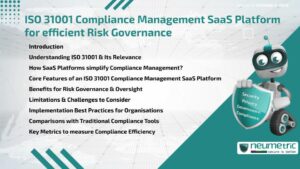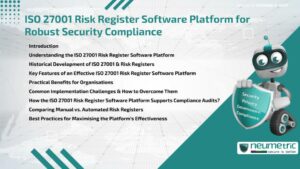Table of Contents
ToggleIntroduction
How to get ISO 27001 Certificate without delays is a question many Organisations face as they strive to secure their Information Systems & gain trust with Stakeholders. Achieving Certification in a timely manner requires a clear understanding of the ISO 27001 Standard, proper Planning, the right People & streamlined Processes. Delays can often result from a lack of Preparedness, poor Documentation & choosing the wrong Certification Body.
This article outlines the fastest route to Certification by identifying common obstacles & offering practical steps to navigate them. Whether you are a Startup or an established Enterprise, this guide offers strategies to accelerate the process while maintaining full compliance.
Understanding ISO 27001 & Why it Matters
ISO 27001 is a globally recognised Standard for Information Security Management Systems [ISMS]. It defines how to manage Information Security in a Structured & Risk-based manner. For Businesses, being ISO 27001 certified signals a serious commitment to protecting Data, complying with Regulations & operating Securely.
Certification also offers competitive advantage, improved Business Continuity & often becomes a requirement when bidding for major Contracts.
Common Causes of Delays in ISO 27001 Certification
Understanding what causes setbacks is the first step toward prevention. The most common delays include:
- Incomplete or disorganised Documentation
- Poor understanding of ISO 27001 Clauses
- Inadequate Internal Audits
- Failure to identify or mitigate Risks early
- Choosing unaccredited or unfamiliar Certification Bodies
- Over-reliance on Third Party Consultants with limited Scope
Recognising these pitfalls early ensures the Certification journey starts strong & stays on track.
Step-By-Step Guide on how to get ISO 27001 Certificate without Delays
Here’s a focused & efficient roadmap to fast-track your Certification:
Step 1: Conduct a Gap Analysis
Use a Checklist aligned to ISO 27001 to identify where your current practices fall short.
Step 2: Define Scope & Objectives
Be clear about the boundaries of your ISMS. The narrower & more focused the Scope, the faster the implementation.
Step 3: Assign Roles & Responsibilities
Build a Cross-functional Team with clear duties. Include IT, HR, Operations & Legal teams for a comprehensive approach.
Step 4: Document the ISMS Framework
Ensure Policies, Procedures, Controls & Risk Treatment Plans are well documented. Documentation quality directly impacts Audit success.
Step 5: Implement Controls & Monitor Progress
Use Annex A controls as a foundation. Track all activities & continuously improve your ISMS Processes.
Step 6: Perform Internal Audit & Management Review
These are prerequisites before Certification. Identify Nonconformities early & take Corrective Action.
Step 7: Choose an Accredited Certification Body
Work with recognised providers such as BSI or TÜV SÜD. Avoid Unaccredited Bodies that may offer quicker timelines at the cost of credibility.
Step 8: Schedule the Certification Audit
Once your Internal Audit confirms readiness, book the External Audit promptly. Keep all evidence & records ready for review.
The Role of Internal Audits & Risk Assessments
Internal Audits are often underestimated but are critical for catching issues early. A well-conducted Audit simulates the external Certification Process & helps you prepare thoroughly.
Likewise, Risk Assessments form the foundation of ISO 27001. They should be systematic, documented & regularly reviewed. Poor or rushed Risk Assessments can trigger Audit failures & extended Certification timelines.
Importance of Documentation & Evidence Collection
Documentation is the backbone of ISO 27001. Every Policy, Process & Control must be supported by written evidence. These include:
- Risk Treatment Plans
- Access Control Procedures
- Incident Response Policies
- Security Training Records
Lack of detailed evidence often leads to repeat Audits or conditional Certifications.
Choosing the Right Certification Body
Certification Bodies vary significantly in terms of service quality and credibility. Consider the following when making a selection:
- Are they accredited by a National Accreditation Body?
- Do they have Auditors experienced in your Sector?
- What is their Audit preparation support like?
- What are the timelines for Audit & issuance of the Certificate?
Working with a reputed body may cost more but drastically reduces the Risk of unnecessary delays.
Balancing Speed with Compliance
While it is tempting to rush through the process, shortcuts can backfire. Speed should not compromise the depth & reliability of your ISMS. Remember, a failed Audit resets the timeline & leads to more work in the long run.
The ideal approach is to optimise for speed & compliance not one at the expense of the other.
Counterpoints & Limitations of Speed-First Certification
Focusing only on speed has its drawbacks. Key limitations include:
- Overlooking deep-rooted Risks
- Superficial documentation
- Resistance from Staff due to poor Change Management
- Risk of losing Certification during Surveillance Audits
It is important to match your Certification goals with your Organisation’s maturity level. Fast-tracking works best for Companies that already have robust security practices in place.
Takeaways
- Know where you stand with a Gap Analysis
- Set a narrow & clear Scope for faster implementation
- Prepare comprehensive documentation & collect evidence
- Conduct thorough Internal Audits & Management Reviews
- Select a trustworthy & accredited Certification Body
- Balance speed with the need for Full Compliance
FAQ
What is the fastest way to get ISO 27001 certified?
Conduct a Gap Analysis, streamline your Documentation & choose a reputable Certification Body with clear Audit timelines.
How long does ISO 27001 Certification usually take?
For prepared Organisations, it can take as little as three (3) to six (6) months. Without preparation, it may extend beyond one (1) year.
Can I get ISO 27001 without using a Consultant?
Yes, especially if your Team has the required expertise. Tools & Templates from trusted sources can support self-guided efforts.
Why does documentation delay ISO 27001 Certification?
Incomplete or unclear documentation leads to Nonconformities during Audits, causing repeat Audits or Rejection.
Is ISO 27001 Certification worth the effort?
Yes, it enhances Data Security, Customer Trust & Compliance posture & opens new Business opportunities.
What should I look for in a Certification Body?
Ensure Accreditation, relevant Sector Experience, a clear Process & realistic but prompt Timelines.
Can fast ISO 27001 Certification impact its credibility?
Yes, if speed compromises quality. Certification without proper Risk Assessments or Documentation may not withstand Surveillance Audits.
Do Internal Audits need to follow a specific format?
Yes, they must be systematic, documented & aligned with ISO 27001 Clauses.
How do I avoid common mistakes in ISO 27001 Certification?
Start with a clear Plan, define Scope early, Audit thoroughly & avoid unaccredited Certification Bodies.
Need help for Security, Privacy, Governance & VAPT?
Neumetric provides organisations the necessary help to achieve their Cybersecurity, Compliance, Governance, Privacy, Certifications & Pentesting needs.
Organisations & Businesses, specifically those which provide SaaS & AI Solutions in the Fintech, BFSI & other regulated sectors, usually need a Cybersecurity Partner for meeting & maintaining the ongoing Security & Privacy needs & requirements of their Enterprise Clients & Privacy conscious Customers.
SOC 2, ISO 27001, ISO 42001, NIST, HIPAA, HECVAT, EU GDPR are some of the Frameworks that are served by Fusion – a SaaS, multimodular, multitenant, centralised, automated, Cybersecurity & Compliance Management system.
Neumetric also provides Expert Services for technical security which covers VAPT for Web Applications, APIs, iOS & Android Mobile Apps, Security Testing for AWS & other Cloud Environments & Cloud Infrastructure & other similar scopes. Reach out to us by Email or filling out the Contact Form…





